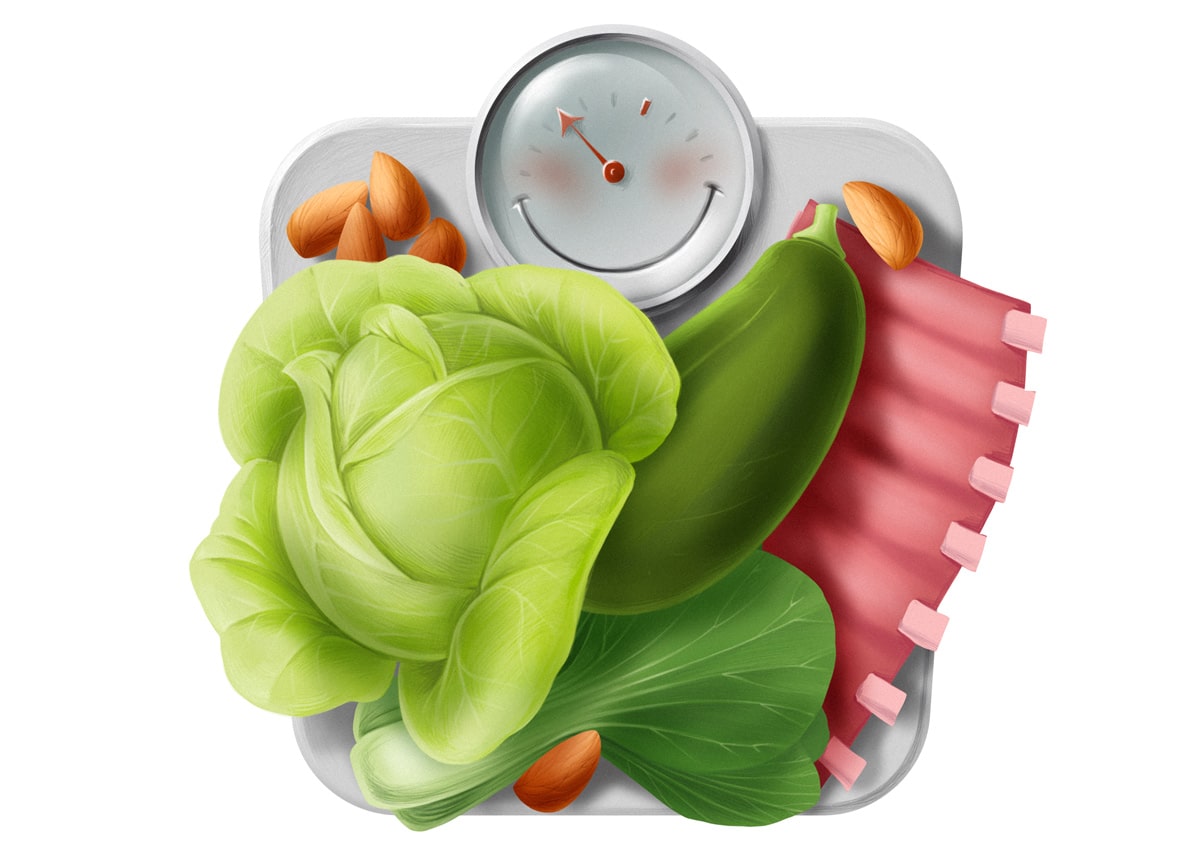Bad breath isn’t a life-threatening problem, but it’s socially embarrassing and it can make life pretty rough, especially if your job has some kind of social component. And even though it sometimes comes from poor oral hygiene, even people with totally solid brush/floss/mouthwash/tongue scraper routines can get breath problems, because not all bad breath is caused by germs in your mouth.

Here’s a look at the relationship between diet and breath, including the infamous “keto breath,” but also including other factors like the bacterial population of your mouth and how different foods you eat can affect odor-causing bacteria.
Diet and Breath
The obvious connection between diet and breath is smelly foods, like garlic, coffee, and fish. Obviously, these foods do have an effect, but it's temporary: you can brush your teeth and get rid of it. A harder problem is bad breath that persists even if you aren't eating anything particularly smelly - clearly there's something else going on here.
This study goes over some of the causes of bad breath. In 90% of cases, the problem has something to do with the bacterial population of the mouth. The human mouth naturally plays host to a lot of different bacteria, just like the gut. Just like healthy gut flora, healthy mouth bacteria don’t cause problems, but if something goes wrong, various species of mouth bacteria can produce several different compounds that make your breath smell bad.
The study also goes over some other related problems. For example, the inflammation involved in gingivitis and other inflammatory diseases can make the problem worse. Another problem is saliva. Saliva basically “washes” the mouth at regular intervals If you’re not making enough saliva for some reason, bacterial populations in the mouth can get more concentrated. Dehydration, diabetes, some medications, and some other treatments can caused reduced salivary flow.
But not all bad breath comes from the byproducts of mouth bacteria. The authors also cite respiratory system diseases (tonsil infections especially), gastrointestinal diseases (like esophagitis) and endocrine system problems (like diabetes and metabolic disorder) as potential causes.
Diet-Related Fixes
The study linked above suggests treatments ranging from the totally obvious (brush your teeth, drink more water) to the less-common (use a tongue scraper). It doesn’t really go into diet, but the causes of bad breath described in the paper suggest some possible diet fixes.
For one thing, there’s that population of mouth bacteria. It’s one thing to just get rid of them with Listerine, but what about asking why they’re out of balance and causing breath problems in the first place? We know that gut bacteria are very modifiable by diet – different types of fiber, carbohydrates, and even fat can change them in various ways. They’re also modifiable by supplements, either probiotics (directly supplementing with helpful bacteria) or prebiotics (supplementing with specific types of fiber that help bacteria grow).
Can mouth bacteria also be modified with diet? Not as easily, but there’s one notable exception: sugar. Sugar is a form of simple carbohydrate, and simple carbohydrates can feed various types of bacteria – this review explains that a long-term high sugar intake can change the bacterial population of the mouth, which is one way that it contributes to causing cavities. The review suggests that the high amount of sugar in the Western diet might be one reason why we need to spend so much time and energy on reducing our mouth bacteria with toothpaste and mouthwash.
Reducing sugar obviously has a benefit for avoiding cavities. It’s not clear yet whether or not this will translate into better breath, because it’s not clear that the species affected are the same species, but it’s worth a shot. The composition of the mouth bacteria can also affect gingivitis, a very common inflammatory disease associated with bad breath, so changing mouth bacteria could affect breath that way. This study suggested probiotics for better oral health via modifying the mouth flora, but noted that we don’t actually know which strains will be helpful for which people.
Another possible way that diet could affect breath is through inflammation. If inflammation can make a bacterial problem worse, then an anti-inflammatory diet may be helpful. This study, for example, gave some evidence that Omega-3 fats can be useful for modulating inflammation in the mouth specifically. Diet can also be very helpful in addressing esophagitis and acid reflux issues, another problem that the study fingered as a cause of bad breath.
And as for the diabetes/endocrine connection…
Diabetes and “Keto Breath:” The Same Symptom, but Two Different Problems

“Keto breath” refers the changes in your breath that sometimes appear on a very low-carb or ketogenic diet. Keto breath smells sweet and a little fruity, and sometimes like nail polish remover or pears; it’s not like ordinary “bad breath.” Not everybody gets it; many lucky people never notice it or see only a very slight difference.
“Keto breath” is basically a side effect of a keto diet that’s running along smoothly. A ketogenic diet forces your body to burn fat for energy instead of carbohydrates. A byproduct of this is ketone bodies. The presence of ketone bodies is a good sign in general – it means you’ve reached ketosis successfully and all the metabolic magic is working correctly – but ketone bodies can cause bad breath when they’re exhaled.
The production of ketones isn’t unique to ketosis. It can also occur in a life-threatening complication of diabetes (especially Type 1 diabetes) called ketoacidosis. In ketoacidosis, the person’s body isn’t making enough insulin, so there are very high levels of glucose in the blood, but the glucose can’t get out of the blood and provide energy to the body. You have to get energy from somewhere, so your body starts burning fat for fuel instead, creating a lot of ketone bodies.
Alcoholics can also go into ketoacidosis, because alcoholism prevents the body from making enough glucose, so it turns to fat for energy and starts making ketones instead.
High levels of blood ketones can cause a sweet-smelling breath whether they come from diabetes or a perfectly safe low-carb diet, but ketosis and ketoacidosis aren’t the same thing just because they both involve high levels of blood ketones. Here’s a free full-text study explaining the difference. Ketoacidosis typically comes with symptoms like dehydration, nausea, and abdominal pain, while regular diet-induced ketosis doesn’t. If you have (or think you have) ketoacidosis, go to the doctor. But keto breath by itself, without ketoacidosis, doesn't point to any serious problems.
Unfortunately, there’s not a huge amount of stuff that reliably works for treating keto breath. Keto breath has nothing to do with oral hygiene or your mouth being dirty, so no variety of brushing/flossing/mouthwash will help, except to mask the smell temporarily. Some people find that it eventually goes away on its own. Other people find that better hydration is helpful.
You can get rid of it completely by going out of ketosis, which doesn't necessarily mean giving up low-carb, just eating enough carbs to stay out of ketosis (50 grams/day is a good ballpark, but your mileage may vary). So if you can reach your particular goals with a low-carb diet but without having to be in ketosis specifically, one option could simply be eating slightly more carbs.
Summing it Up
For most people with bad breath, oral hygiene can significantly help if not solve the problem. Brushing, flossing, mouthwash, and a tongue scraper are basics. Hydration can also help. But if you’re reading this, you’ve probably tried that to no avail – and there are other reasons why your breath might be bad.
For one thing, it’s true that bacteria in the mouth cause a lot of breath problems, but instead of just killing them off with antiseptic mouthwash, it’s worth asking why you have an overabundance of some particular bacteria. Is it because you eat a lot of sugar? Or is there an inflammatory disease making things worse? These things can be addressed with diet.
Another problem is keto breath, which is not the typical rank “bad breath” kind of smell. It’s a slightly sweet, “fruity” type of smell. Sometimes it goes away on its own but other times there’s just not much to do about it unless you’re willing to go out of ketosis. Gum, mints, mouthwash, brushing, flossing, and other oral hygiene will only mask the smell, since the ultimate problem is not coming from your mouth.





Leave a Reply